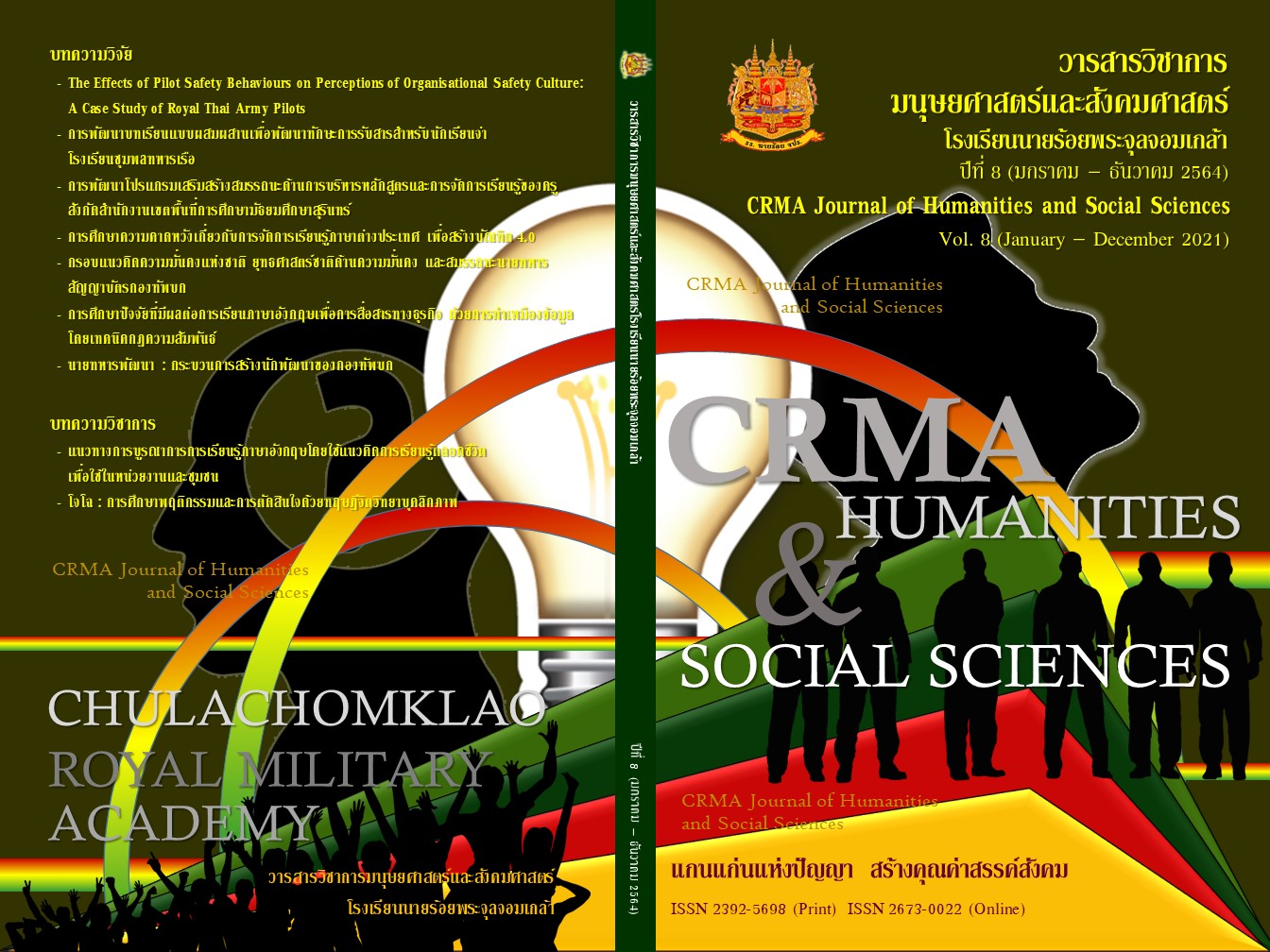THE DEVELOPMENT OF A PROGRAM TO ENHANCE COMPETENCY IN CURRICULUM ADMINISTRATION AND LEARNING MANAGEMENT FOR TEACHERS UNDER THE SURIN SECONDARY EDUCATIONAL SERVICE AREA OFFICE
Keywords:
Competency, Curriculum Administration, Learning ManagementAbstract
This research aims to: 1) study the current states, the desirable conditions and the priority needs of competency in curriculum administration and learning management for teachers; and 2) to develop a program to enhance competency in curriculum administration and learning management for teachers. The sample was 472 school administrators and teachers under the Surin Secondary Educational Service Area Office. The sample was derived by stratified random sampling. The research tools were: 1) a set of questionnaires to assess the current state and the desirable conditions of competency in curriculum administration and learning management; 2) an interview form; and 3) a program assessment form. The statistics were analyzed by using frequency, percentage, mean, standard deviation, reliability, and Modified Priority Needs Index. The results showed that: 1) The overall current states of competency in curriculum administration and learning management for teachers were at a high level. The overall desirable conditions were at the highest level. As for the priority needs for development, ordered from most to least were: Classroom management, Measuring and evaluating learning outcomes, Utilization, and development of innovative media, Learning design and organization, Learner-centered learning organization, and Curriculum construction and development. 2) The development program to enhance competency in curriculum administration and learning management for teachers under the Surin Secondary Educational Service Area Office was divided into 2 parts. The first part was the development program, which is organized into 6 parts: Principles, Objectives, Program Structure, Development methodology, Techniques and tools, and Measurement and assessment. The program content consisted of 6 modules: 1) Curriculum construction and development; 2) Learning design and organization; 3) Classroom management; 4) Learner-centered learning organization; 5) Utilization and development of innovative media; and 6) Measuring and evaluating learning outcomes. The second part was the program evaluation, which found that overall, the program content was highly appropriate and could be realistically implemented.
References
กระทรวงศึกษาธิการ. (2545). พระราชบัญญัติการศึกษาแห่งชาติ พ.ศ. 2542 (แก้ไขเพิ่มเติมฉบับที่ 2 พ.ศ. 2545). กรุงเทพฯ : เดอะบุคส์.
ไฉไลศรี เพชรใต้. (2563). การพัฒนาโปรแกรมเสริมสร้างสมรรถนะการจัดการเรียนรู้ของครูประถมศึกษา สังกัดสำนักงานคณะกรรมการการศึกษาขั้นพื้นฐาน. วารสารสังคมศาสตร์และมานุษยวิทยาเชิงพุทธ. 5(11), 170-184.
ชัยนาท พลอยบุตร. (2559). การพัฒนาโปรแกรมเสริมสร้างสมรรถนะครูด้านการบริหารหลักสูตรและการจัดการเรียนรู้ สำหรับสถานศึกษา สังกัดสำนักงานเขตพื้นที่การศึกษามัธยมศึกษา เขต 30. (วิทยานิพนธ์การศึกษามหาบัณฑิต, สาขาบริหารและพัฒนาการศึกษา). มหาวิทยาลัยมหาสารคาม.
ไท คำล้าน. (2551). การพัฒนาโปรแกรมฝึกอบรม เพื่อเสริมสร้างภาวะผู้นำทางสิ่งแวดล้อมศึกษาสำหรับผู้บริหารสถานศึกษา. (วิทยานิพนธ์การศึกษาดุษฎีบัณฑิต, สาขาวิชาการบริหารและพัฒนาการศึกษา). มหาวิทยาลัยมหาสารคาม.
ธนานันต์ ดียิ่ง. (2556). โปรแกรมการพัฒนาสมรรถนะครูระดับการศึกษาขั้นพื้นฐาน ด้านการวัดและประเมินผลในชั้นเรียน. (วิทยานิพนธ์ปรัชญาดุษฎีบัณฑิต, สาขาวิชาหลักสูตรและการสอน). มหาวิทยาลัยศิลปากร.
ธำรง บัวศรี. (2542). ทฤษฎีหลักสูตร : การออกแบบหลักสูตรและพัฒนา. กรุงเทพฯ: ธนรัช.
บุญชม ศรีสะอาด. (2553). การวิจัยเบื้องต้น. พิมพ์ครั้งที่ 8. กรุงเทพฯ: สุวีริยาสาส์น.
ประโมทย์ นันนิล. (2561). การพัฒนาโปรแกรมเสริมสร้างสมรรถนะครูด้านการบริหารหลักสูตรและการจัดการเรียนรู้สำหรับสถานศึกษา สังกัดสำนักงานเขตพื้นที่การศึกษามัธยมศึกษา เขต 25. (วิทยานิพนธ์การศึกษามหาบัณฑิต, สาขาวิชาการบริหารและพัฒนาการศึกษา). มหาวิทยาลัยมหาสารคาม.
ปริญญา มีสุข. (2552). ผลของการออกแบบโปรแกรมการพัฒนาทางวิชาชีพแบบมีส่วนร่วมของครู. (วิทยานิพนธ์ปริญญาครุศาสตรดุษฎีบัณฑิต, สาขาวิชาวิธีวิทยาการวิจัยการศึกษา). จุฬาลงกรณ์มหาวิทยาลัย.
มนตรี รัตนศรี. (2561). โปรแกรมเสริมสร้างสมรรถนะครูด้านการบริหารหลักสูตรและการจัดการเรียนรู้ สำหรับสถานศึกษา สังกัดสำนักงานเขตพื้นที่การศึกษาประถมศึกษากาฬสินธุ์ เขต 2. (วิทยานิพนธ์การศึกษามหาบัณฑิต, สาขาวิชาการบริหารและพัฒนาการศึกษา). มหาวิทยาลัยมหาสารคาม.
ยอดอนงค์ จอมหงษ์พิพัฒน์. (2553). การพัฒนาโปรแกรมพัฒนาครูผู้นำการจัดการเรียนรู้ตามแนวทางปฏิรูปการศึกษาขั้นพื้นฐาน. (วิทยานิพนธ์ปริญญาครุศาสตรดุษฎีบัณฑิต, สาขาวิชาภาวะผู้นำทางการบริหารการศึกษา). มหาวิทยาลัยราชภัฏสกลนคร.
รักษิต สุทธิพงษ์. (2560). กระบวนทัศน์ใหม่ทางการศึกษากับการพัฒนาครูไทยในยุคดิจิตอล. วารสารศึกษาศาสตร์ มหาวิทยาลัยนเรศวร. 19(2), 344-355.
สำนักงานเขตพื้นที่การศึกษามัธยมศึกษา เขต 33. (2562). รายงานการประเมินตนเอง (SAR) สำนักงานเขตพื้นที่การศึกษา มัธยมศึกษา เขต 33. สุรินทร์: สำนักงานเขตพื้นที่การศึกษามัธยมศึกษา เขต 33.
สำนักงานคณะกรรมการการศึกษาขั้นพื้นฐาน. (2553). พระราชบัญญัติการศึกษาแห่งชาติ พ.ศ.2542 และที่แก้ไข เพิ่มเติม (ฉบับที่ 3) พ.ศ.2553. กรุงเทพฯ : สำนักนายกรัฐมนตรี.
สำนักงานเลขาธิการคุรุสภา. (2561). สมรรถนะ. กรุงเทพฯ: โรงพิมพ์คุรุสภา.
สำนักงานเลขาธิการสภาการศึกษา. (2556). กรอบคุณวุฒิแห่งชาติ = National Qualifications Framework (Thailand NQF). สำนักงานเลขาธิการสภาการศึกษา กระทรวงศึกษาธิการ. กรุงเทพฯ : สำนักงานเลขาธิการสภาการศึกษา.
สำนักพัฒนาครูและบุคลากรทางการศึกษาขั้นพื้นฐาน. (2553). คู่มือประเมินสมรรถนะครู สำนักงานคณะกรรมการการศึกษาขั้นพื้นฐาน พ.ศ.2553. กรุงเทพฯ : สำนักพัฒนาครูและบุคลากรทางการศึกษาขั้นพื้นฐาน.
สำนักพัฒนาระบบจำแนกตำแหน่งและค่าตอบแทนสำนักงาน ก.พ. (2552). มาตรฐานและแนวทางการกำหนดความรู้ ความสามารถ ทักษะและสมรรถนะที่จำเป็นสำหรับตำแหน่งข้าราชการพลเรือนสามัญ. นนทบุรี: พี.เอ.ลีฟวิ่ง.
สุวัฒน์ จุลสุวรรณ์. (2554). การพัฒนาภาวะผู้นําการเปลี่ยนแปลงผู้บริหารสายสนับสนุนสถาบันอุดมศึกษาของรัฐ. (วิทยานิพนธ์ปริญญาการศึกษาดุษฎีบัณฑิต, สาขาวิชาการบริหารและพัฒนาการศึกษา). มหาวิทยาลัยมหาสารคาม.
อำนวย จันสำโรง. (2561). การพัฒนาโปรแกรมเสริมสร้างสมรรถนะครูด้านการบริหารหลักสูตรและการจัดการเรียนรู้ ของ สถานศึกษา สังกัดสำนักงานเขตพื้นที่การศึกษาประถมศึกษาร้อยเอ็ด เขต 2. (วิทยานิพนธ์การศึกษามหาบัณฑิต, สาขาวิชา การบริหารและพัฒนาการศึกษา). มหาวิทยาลัยมหาสารคาม.
Barr, M.J. and L.A. Keating. (1990). Developing Effective Student Services Programs: Systematic Approaches for Practitioners. San Francisco: Jossey-Bass.
Hough, J.B. and Duncan, K. (1970). Teaching Description and Analysis. s.n.: Addison- Westlu.
Krejcie, R. V. & Morgan, D. W. (1970). Determining Sample Size for Research Activities. Educational and Psychological Measurement, 30(3), pp. 607-610.
Downloads
Published
How to Cite
Issue
Section
License
The content and information in this journal shall be considered as the individual opinions of the authors. In all cases, the editorial board may not necessarily agree with these opinions or be responsible for them.
The articles and information that are published in the journal are considered to be the copyright of the journal. Any party who wishes to re-publish the journal’s articles must seek permission from the journal’s editor. Articles that receive the agreement for publications must not appear in any other publications prior to their appearance in this journal. The editorial board will send one copy of the journal to each author whose submission was accepted and published.







